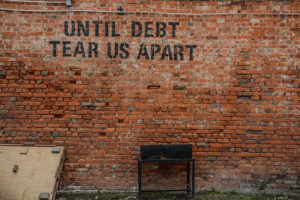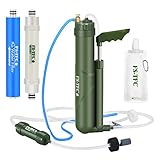One of the biggest fears for preppers today is the possibility of an economic collapse.
We are seeing it more and more around the world in places such as Greece and Venezuela. Many are convinced that we will see a major economic collapse in the United States within the next ten years.
That doesn’t seem so farfetched if you look at the numbers. No one wants to talk about or acknowledge that we are in massive debt that could collapse our country if nothing is done.
What is Our Current National Debt?

- On February 11, 2019, it exceeded $22 trillion
- It passed the milestone of $21 trillion on March 15, 2018
- Barack Obama’s administration managed to rack up nearly as much debt in eight years than in the entire 232-year history of the country before he took office
- At the beginning of his presidency, there was $10.6 trillion in total debt and when he left office, the debt was $19.9 trillion
- The interest on the national debt is $364 billion yearly
Current Student Loan Debt
- There’re 37 million student loan borrowers with outstanding loans
- According to the Federal Reserve Bank of New York, outstanding student loan debt in the United States lies between $902 Billion and $1 Trillion with around $864 Billion in Federal student loan debt and we still have politicians demanding free education
- We have men and women in their 20’s with tens of thousands of dollars in student debt and they are now taking out loans for homes, cars and whatever toys the need to keep up with the “Joneses”
Factors That Many Don’t Want to Discuss
- The greed of the politicians
- Tax hikes to pay for entitlements
- People walking around with their blinders on thinking that the Government will take care of everything
An Economic Collapse vs Economic Crisis
An economic collapse is quite different than a crisis. The effects of a collapse are much longer than that of a crisis. Further, a collapse can affect multiple aspects of society.
In the 2007-2009 financial crisis that we called the Great Recession lasted less than two years and mainly only the United States experienced negative GDP growth.
The Great Depression on the other hand, lasted from 1929 to 1939 and wiped out more than a quarter of the United States GDP. Moreover, the Depression cause an unemployment rate of over 24 percent. The peak during the Great Recession was around 10 percent.
The Great Depression
When we think of economic collapse in the United States, we think of the Great Depression. This was the worst economic downturn in the history of the industrialized world.
One only needs to take a look at history, specifically the Roaring Twenties and other Global events to see how we are in a similar situation.
The Stock Market Crash of 1929
- On October 24, 1929, worried investors began selling overpriced shares in masses. A record 12.9 million shares were traded on the day we now know as “Black Thursday.”
- Five days later or “Black Tuesday,” 16 million shares were traded after another wave of fear swept across Wall Street.
- Millions of shares ended up worthless, and those investors who had bought stocks with borrowed money were completely wiped out
- Bank runs swept the United States again in 1931 and 1932
- Nine thousand banks failed during the months following the stock market crash
- Consumer confidence vanished
- There was a downturn in spending and investment that led factories and other businesses to slow down production and begin firing workers
- Americans forced to buy on credit fell into debt and lost everything
Other Factors that Contributed to the Great Depression
- The Roaring twenties – Before the world entered into an economic decline, the performance of the stock market was well above average, and the industrial output more profitable than it had ever been
- Ensuing Global Crisis – Other countries around the World felt the effects of the Great Depression and many Global factors contributed to the severity of the depression
- The Dust Bowl – Relate this to our current environmental issues with extreme activist and politicians that are trying to regulate to such a degree that business can’t survive
- The Smoot-Hawley Tariff Act – U.S. legislation (June 17, 1930) that raised import tariffs to protect American businesses and farmers, adding considerable strain to the international economic climate of the Great Depression
How Does the Great Depression Compare to Today?
You’ve heard the saying that “History repeats itself,” and it does, but never in exactly the same way.
- Populism on the rise – Populism is a range of political tactics that deliberately appeal to ‘the people’, often employing one group against the “elite” or another group. We can see this on both sides of the political platform, but many politicians are consumed with this effort

How Does the Great Depression Compare to Today - In the Great Depression, banks, insurance companies, and big corporations went under by the thousands. Today, financial institutions may be in even worse shape, but ethics have changed, and everyone expects the Government to bail them out
- In the 1930s, if a person lost their job, they had to find another one as quickly as possible to keep from starving. Today, the average person can go on unemployment insurance and when that runs out they sign up for welfare. They can avoid work instead of taking whatever they could find because they may get their hands dirty
- During the Depression, many had to rely on their family, friends, or local social and church groups. Today, over 50 percent of the population is already on some sort of social program. Even if you consider that times currently are “good,” these programs are in big trouble of failing
- Income taxes were new during the Great Depression, now the government heavily relies on workers income tax, but the Government can’t get what doesn’t exist if no one is working
- Here is a big one: back then, most of the country was still rural. Today, people are crammed into cities and reliant on other transportation and ease of access to almost anything such as food, water, sanitation, and other necessities. Things like these will go up in cost or become nonexistent.
- The United States was fairly isolated from the rest of the world at the time of the Great Depression. Today, we are connected to everything and interdependent, so what affects another country around the World could potentially affect us.
What Can I Do to Prepare and Survive an Economic Collapse?

First and foremost, do everything within your power to get out of debt!
- Keep your preps current by stocking food, water and other supplies then rotate that stock.
- Keep the maintenance on your vehicle and your home current. Take care of anything that has been failing because there may not be the resources to fix them when the economy collapses.
- Practice new skills, skills in a bad economy are worth money, although less money, you can trade your skills and time for food, water, or anything else you may need.
- During the Great Depression, cash was king, but many lost everything to bank failures. Always have a backup source of cash available. Even when things are “good,” you should keep cash on hand for emergencies.
- It won’t hurt to keep a few dollars in precious metals, although this has been debated, silver and gold were still worth their weight in the Great Depression.
- This is a difficult one for some but if all possible, buy land, start a homestead. If you can’t purchase land or you don’t already have a bug out location (BOL), try to use as much of the resources and space you currently have.
- Stock things to barter, your services, time, talents, skills, and other things of value can be traded to those who have an abundance of other supplies.
- Stop spending NOW! Stop spending money on frivolous things such as going to the movies, expensive coffee and for the love of God, stop trying to keep up with the Joneses. You don’t need that new jet ski or that new boat, that money is better spent elsewhere. Further, buy your vehicles used, you save so much money when buying used.
- Create a budget and stick to it!
- Start saving some money today. Pay yourself first even if it isn’t much. Every penny counts!
- Find ways to cut your monthly bills. Do you really need ten thousand channels on the dish? Do you really need that fully loaded new car?
- Learn to protect your family and your supplies. It does no good to stock up and prepares for the worst if some bad guys can just walk in and take it. Get your home hardened for a disaster and learn some self-defense methods while it’s still the calm before the storm.
- Get to know your neighbors while times are good. No one can be 100 percent self-sufficient.
- Finally, get in shape… get healthy… eat right, and exercise. Medical costs are outrageous today, can you imagine what it will take to get medical attention in a collapsed economy? For many, including me, this is one of the hardest preps to get under control. Without our health, you really don’t have anything.
Conclusion
No one really knows what will happen if we have a Great Depression today. But I do know it won’t be pretty.
Although many of us have already been affected by some of the more recent recessions, something like the Great Depression today will wreak havoc on our society to a degree no one can predict.
EVERLIT 250 Pieces Survival First Aid Kit IFAK EMT Molle Pouch Survival Kit Outdoor Gear Emergency Kits Trauma Bag for Camping Boat Hunting Hiking Home Car Earthquake and Adventures
20% OffAuto Amazon Links: No products found. No products found.













